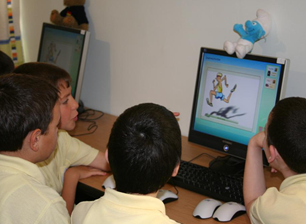UoM team success in Imagine Cup
 Back
Back
Imagine Cup is an annual competition organised by Microsoft Corporation which brings together young technologists worldwide to help resolve some of the world’s toughest challenges. Imagine Cup 2007 was themed "Imagine a world where technology enables a better education for all." Participants were encouraged to use cutting-edge technologies to come up with creative and innovative solutions for improving educational opportunities for students around the world. This mission is closely aligned with the Education For All (EFA) goals, established by the United Nations Educational, Scientific and Cultural Organization (UNESCO), which aim to "universalize primary education and massively reduce illiteracy by the end of the decade". The Maltese team who participated in this year's competition consisted of four B.Sc. I.T. students of the University of Malta: Abigail Cauchi, Jennifer Fenech, Karl Fenech and Luana Micallef.
One of the most difficult challenges is that of balancing educational objectives with technical limitations and harsh financial realities, especially in developing countries such as India. Governments have to deal with the issue of software distribution, as educational packages must be researched, purchased, possibly customised, delivered to all schools, installed, and then updated continuously. One is typically also faced with high student-to-computer ratios, sometimes having ten children using the same computer, out of which only one student (usually the most dominant) would be controlling the mouse. This makes it quite difficult, if not impossible, to keep each student engaged – the process of learning requires that the student is actively involved in the learning activities he/she is participating in. Losing the student’s interest renders the learning process ineffective.
A plausible solution to the latter challenge would be the recently-introduced Windows MultiPoint, a powerful technology enabling multiple users to simultaneously and interactively share a single computer using multiple mice and cursors identifiable by their colour. MultiPoint helps shift the student from passive to active learning, and the collaborative environment adds a whole new layer of value to the computer in the classroom. The solution put forth by the Maltese team is a fully-integrated MultiPoint system which is easy to use, extensible, and most importantly, promotes a constructivist pedagogy and an intuitive way for teachers to make their lessons more interactive, interesting and collaborative. Through the system, students may be assessed whilst engaging in educational software activities, enhancing their motivation. State-commissioned or commercial developers may upload new applications which would be seamlessly incorporated into the system and immediately available within all classrooms.
 The system was devised following extensive research on learning paradigms, including collaboration and the use of games within the educational context, and is meant as a key – a motivational prototype – for eventual deployment in real-life scenarios. It is meant to serve as a platform for deploying educational software through an extensible architecture which provides inherent support for MultiPoint functionality, inter-computer communication, user identification, and progress tracking. Seamlessly integrated, it would bind all stakeholders (developers, administration, teachers, and students) in their respective roles, amplifying the dissemination of knowledge and providing enhanced educational opportunities for all, irrespective of age and financial conditions. The system also enables an innovative edge, giving unbounded opportunities for the development of applications to best meet the local demands. All this is captured in the title chosen for the project: KIKI, a Key to the Integration of Knowledge and Innovation.
The system was devised following extensive research on learning paradigms, including collaboration and the use of games within the educational context, and is meant as a key – a motivational prototype – for eventual deployment in real-life scenarios. It is meant to serve as a platform for deploying educational software through an extensible architecture which provides inherent support for MultiPoint functionality, inter-computer communication, user identification, and progress tracking. Seamlessly integrated, it would bind all stakeholders (developers, administration, teachers, and students) in their respective roles, amplifying the dissemination of knowledge and providing enhanced educational opportunities for all, irrespective of age and financial conditions. The system also enables an innovative edge, giving unbounded opportunities for the development of applications to best meet the local demands. All this is captured in the title chosen for the project: KIKI, a Key to the Integration of Knowledge and Innovation.
The team tested the system with the help of a primary state school using a class of thirty students. The setup consisted of eight computers for the students, each having three to four mice connected, and the teacher’s computer. The competitive aspect brought about by this fresh pedagogy was very successful at keeping the students engaged in a typical lesson. The students were absorbed throughout the lesson, with a constant display of enthusiasm towards the new system. Meanwhile, the teacher found it easier to control her class and, with the help of the real-time progress-monitoring system, had more control on the performance of each student.
The Maltese team was successful at making it to the Imagine Cup finals held in Seoul, South Korea in August 2007, and was awarded a three-month internship with Microsoft Research India for best use of the MultiPoint technology. An academic paper has been presented during this year's Computer Science Annual Workshop (CSAW), organised by the departments of Computer Science and Artificial Intelligence from the University of Malta. This is available from the team's website.